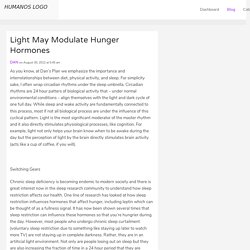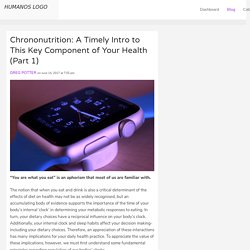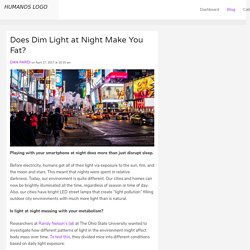

The Internal Circadian Clock Increases Hunger and Appetite in the Evening Independent of Food Intake and Other Behaviors. Delayed meal times reset body clocks. Eating at 'wrong time' affects body weight, circadian rhythms. How Late Night Snacking Wrecks Your Energy - The Energy Blueprint. Meal Timing and Composition Affects the Circadian Clock. Light May Modulate Hunger Hormones. On August 30, 2012 at 5:45 am As you know, at Dan’s Plan we emphasize the importance and interrelationships between diet, physical activity, and sleep.

For simplicity sake, I often wrap circadian rhythms under the sleep umbrella. Circadian rhythms are 24 hour patters of biological activity that – under normal environmental conditions – align themselves with the light and dark cycle of one full day. While sleep and wake activity are fundamentally connected to this process, most if not all biological process are under the influence of this cyclical pattern. Light is the most significant moderator of the master rhythm and it also directly stimulates physiological processes, like cognition. Switching Gears Chronic sleep deficiency is becoming endemic to modern society and there is great interest now in the sleep research community to understand how sleep restriction affects our health. A Problematic Use Case – The Computer Programmer Cheers from Leiden!
Chrononutrition: A Timely Intro to This Key Component of Your Health (Part 1) “You are what you eat” is an aphorism that most of us are familiar with.

The notion that when you eat and drink is also a critical determinant of the effects of diet on health may not be as widely recognised, but an accumulating body of evidence supports the importance of the time of your body’s internal ‘clock’ in determining your metabolic responses to eating. In turn, your dietary choices have a reciprocal influence on your body’s clock. Chrononutrition: Shortened Eating Windows, Breakfast-skipping, Eating Late, and More (Part 2)
On July 21, 2017 at 12:19 am In Part 1, we briefly looked at how the circadian system times our daily patterns of behaviour and physiology, as well as how the circadian system is synchronized with the 24 hour day.

In doing so, we discussed how the foods we eat, and the types and amounts of nutrients available, are key to synchronizing the ‘clocks’ in many of our bodies’ tissues. Today, we will delve deeper into this subject, exploring the many ways that when we eat influences our metabolic health. Research has found that if other animals eat at times when they would typically be asleep (night-time for us), they tend to get fatter and experience other metabolic disorders. But when they can only eat in a shortened eating window of 12 or less hours each day they are leaner and healthier. Rodents suffer from bad health effects when they eat at the ‘wrong’ times We see this clearly in rodents. But what about us humans? Timing nuances. You Burn the Most Calories During This Time of the Day, a Study Finds. November 14, 2018 Weight loss would be so much easier if we had a magic formula telling us the best time of day to work out to burn the most calories, wouldn’t it?

Unfortunately, that’s not yet possible, but new research helps scientists understand how it might work. “The conventional wisdom is that if you want to measure someone’s REE, you don’t really pay attention to what time of day you do it. You take the measurement and assume that it’s the true measurement,” says senior study author Jeanne Duffy, PhD, associate neuroscientist in the division of sleep and circadian disorders at Brigham and Women’s Hospital in Boston. The findings don’t necessarily show if weight loss is easier at different times of day, Dr.
“It’s really a leap of logic to say that we should be thinking that we might burn more or less calories at different times of day,” Duffy says. RELATED: 21 Tips for Weight Loss That Actually Work Why the New Findings May Matter for Shift Workers. Chrononutrition: Consistent Eating Patterns, Caffeine, and Principles for Better Health (Part 3 with Podcast)
On August 17, 2017 at 11:04 pm Eating at roughly the same times each day may improve things like blood sugar control and appetite regulation.Caffeine can modify circadian rhythms and could help you adjust to new time-zones more quickly if used intelligently.

If you’re flying west, for instance, you might try consuming some caffeine late in the day to speed synchronization to the new time-zone.Considering your chronotype can help you optimize your diet according to your own circadian biology.Shortened eating windows can be useful, but aren’t for everybody. When Is the Best Time to Eat? Around this time of year, much of the world is advancing their clocks by one hour to make efficient use of seasonal daylight.

Americans switched to Daylight Saving Time last week, and this week Europeans will revert to Summer Time. When this happens, we all “lose” an hour of sleep, because we have to get up and get things done an hour earlier than we have been. This is in relation not just to the light and dark cycles of the day, but also to our body clocks. One hour sounds like a small change, but it can make a big difference in how we function, at least in the short term. For example, data from the past two decades shows that there is a statistically significant spike in the number of car wrecks on the Monday immediately following the shift to Daylight Saving Time in the US.
As we all adjust to the time change, it’s worthwhile to consider how other aspects of our lives can sway our circadian rhythms. Cellular Energy Needs Shift across the Day A recent study by Dr. References. Certain Dietary Fats Disrupt the Coordination of Metabolism, Others Don't. On April 8, 2016 at 7:44 pm This is my second article on food and the circadian system.

The science of body timing rhythms is complicated. But, like diet and exercise, it’s worth investing some mental effort to understand the fundamental aspects of it because not only is it crucial to health and wellbeing, but also because it is a topic on which you can take action! Circadian Rhythms The circadian rhythm is a complex system that helps our body coordinate physiology and behavior across a 24-hour period of a day. We can adjust our body timing without causing health problems (e.g., slow change of the seasons). Fuel Preference Changes across the Day In my previous article entitled When Is the Best Time to Eat, we discussed research on how enzymes that determine the rate of energy generation from glucose and fats wax and waned across the day.
Metabolic Control. Feeding Time // Diabetes Reversal // Weight Maintenance. On April 25, 2016 at 11:03 pm Here is a recap of some of the most interesting stories in science and health that we’ve been reading and discussing over the past week – focusing on regulation of body fat and blood sugar.

First, a group of Japanese researchers demonstrated how circadian misalignment, caused by shifted feeding patterns, can wreak metabolic havoc. Perhaps more importantly, they uncovered what precisely is happening inside of the brain and body to at least partially cause this. Next, we look at an English study, which revealed a way to that we might be able to put diabetes in remission – without drugs. Does Dim Light at Night Make You Fat? On April 27, 2017 at 10:10 am Playing with your smartphone at night does more than just disrupt sleep.

Before electricity, humans got all of their light via exposure to the sun, fire, and the moon and stars. This meant that nights were spent in relative darkness. The Impact of Sleep and Circadian Disturbance on Hormones and Metabolism.